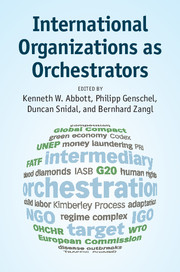Book contents
- Frontmatter
- Contents
- List of Figures
- List of Tables
- List of Contributors
- Acknowledgments
- List of Abbreviations
- Part I Introduction
- Part II Managing states
- Part III Bypassing states
- 8 WHO orchestrates?
- 9 Orchestrating peace?
- 10 Governing where focality is low
- 11 Orchestration for the “social partners” only
- 12 Orchestrating the fight against anonymous incorporation
- Part IV Implications
- References
- Index
11 - Orchestration for the “social partners” only
internal constraints on the ILO
Published online by Cambridge University Press: 05 April 2015
- Frontmatter
- Contents
- List of Figures
- List of Tables
- List of Contributors
- Acknowledgments
- List of Abbreviations
- Part I Introduction
- Part II Managing states
- Part III Bypassing states
- 8 WHO orchestrates?
- 9 Orchestrating peace?
- 10 Governing where focality is low
- 11 Orchestration for the “social partners” only
- 12 Orchestrating the fight against anonymous incorporation
- Part IV Implications
- References
- Index
Summary
Abstract
The ILO has since its inception been characterized by a particular type of “corporatist” orchestration, which relies extensively, but also exclusively, on trade unions and employer associations as intermediaries. This chapter analyzes the conditions under which an international organization like the ILO – in which particular civil society intermediaries (trade unions and employer associations) are institutionally involved in the governance structure – would be willing to collaborate with a broader range of non-state intermediaries. The analysis is based on a structured comparison of two policy proposals, on a social label and on the worst forms of child labor. The child labor proposal is a case of successful civil society involvement; the social label one is a case of non-involvement. I argue that the “worst forms of child labor” proposal was adopted because a broad coalition of northern and southern governments supported it. No such coalition emerged in the other case, leading to the proposal’s demise. The staunch opposition of the “social partners” (trade unions and employers associations) also blocked further attempts to modify the ILO’s internal governance structure.
Introduction
This chapter seeks to explain the limited ability of the ILO to enlist the contribution of NGOs and other civil society organizations to its governance activities. Several features emphasized in the framework chapter should in theory provide fertile ground for ILO orchestration activities. These include a large number of potential civil society intermediaries; the ILO’s focality in the labor field; the organization’s lack of command-and-control prerogatives, making it necessary to resort to indirect action; and its legitimacy and technical expertise in the field of labor policy, which potentially make it an attractive partner for civil society intermediaries (Abbott et al., in this volume).
- Type
- Chapter
- Information
- International Organizations as Orchestrators , pp. 262 - 285Publisher: Cambridge University PressPrint publication year: 2015
- 9
- Cited by



